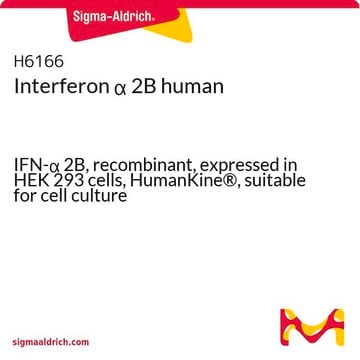SRP3169
TFF3 human
recombinant, expressed in E. coli, ≥98% (SDS-PAGE), ≥98% (HPLC), suitable for cell culture
Sinónimos:
ITF, TFI, Intestinal trefoil factor, Trefoil Factor 3
About This Item
Productos recomendados
biological source
human
recombinant
expressed in E. coli
assay
≥98% (HPLC)
≥98% (SDS-PAGE)
form
lyophilized
potency
1.0-10.0 mg per mL
mol wt
13.2 kDa
packaging
pkg of 20 μg
technique(s)
cell culture | mammalian: suitable
impurities
<0.1 EU/μg endotoxin, tested
color
white
UniProt accession no.
shipped in
wet ice
storage temp.
−20°C
Gene Information
human ... TFF3(7033)
General description
The trefoil factor peptides (TFF1, TFF2, and TFF3) are secreted in the gastrointestinal tract. They are secreted peptides which are protease-resistant. TFF-3 is expressed by goblet cells and in the uterus, and has also been shown to be expressed in certain cancers, including colorectal, hepatocellular, and in biliary tumors. Recombinant human TFF3 is a homodimeric protein consisting of two 59 amino acid chains, which includes a 40-amino acid trefoil motif containing three conserved intramolecular disulfide bonds.
Application
Biochem/physiol Actions
Sequence
Physical form
Reconstitution
Storage Class
11 - Combustible Solids
wgk_germany
WGK 3
flash_point_f
Not applicable
flash_point_c
Not applicable
Certificados de análisis (COA)
Busque Certificados de análisis (COA) introduciendo el número de lote del producto. Los números de lote se encuentran en la etiqueta del producto después de las palabras «Lot» o «Batch»
¿Ya tiene este producto?
Encuentre la documentación para los productos que ha comprado recientemente en la Biblioteca de documentos.
Nuestro equipo de científicos tiene experiencia en todas las áreas de investigación: Ciencias de la vida, Ciencia de los materiales, Síntesis química, Cromatografía, Analítica y muchas otras.
Póngase en contacto con el Servicio técnico








